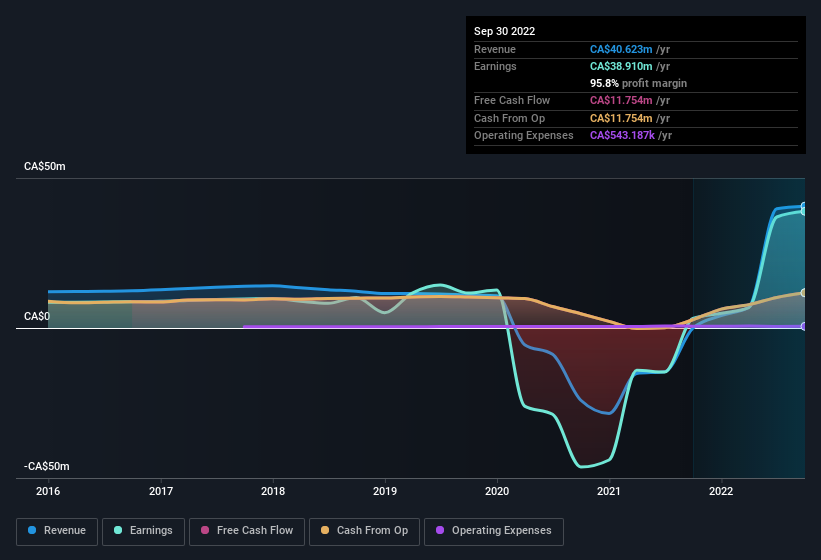- Canada
- /
- Hospitality
- /
- TSX:SRV.UN
SIR Royalty Income Fund's (TSE:SRV.UN) Profits Appear To Have Quality Issues
SIR Royalty Income Fund's (TSE:SRV.UN) robust recent earnings didn't do much to move the stock. We think this is due to investors looking beyond the statutory profits and being concerned with what they see.
View our latest analysis for SIR Royalty Income Fund

A Closer Look At SIR Royalty Income Fund's Earnings
In high finance, the key ratio used to measure how well a company converts reported profits into free cash flow (FCF) is the accrual ratio (from cashflow). In plain english, this ratio subtracts FCF from net profit, and divides that number by the company's average operating assets over that period. The ratio shows us how much a company's profit exceeds its FCF.
That means a negative accrual ratio is a good thing, because it shows that the company is bringing in more free cash flow than its profit would suggest. While having an accrual ratio above zero is of little concern, we do think it's worth noting when a company has a relatively high accrual ratio. That's because some academic studies have suggested that high accruals ratios tend to lead to lower profit or less profit growth.
Over the twelve months to September 2022, SIR Royalty Income Fund recorded an accrual ratio of 0.49. Ergo, its free cash flow is significantly weaker than its profit. Statistically speaking, that's a real negative for future earnings. In fact, it had free cash flow of CA$12m in the last year, which was a lot less than its statutory profit of CA$38.9m. At this point we should mention that SIR Royalty Income Fund did manage to increase its free cash flow in the last twelve months
Note: we always recommend investors check balance sheet strength. Click here to be taken to our balance sheet analysis of SIR Royalty Income Fund.
Our Take On SIR Royalty Income Fund's Profit Performance
As we have made quite clear, we're a bit worried that SIR Royalty Income Fund didn't back up the last year's profit with free cashflow. As a result, we think it may well be the case that SIR Royalty Income Fund's underlying earnings power is lower than its statutory profit. But the happy news is that, while acknowledging we have to look beyond the statutory numbers, those numbers are still improving, with EPS growing at a very high rate over the last year. The goal of this article has been to assess how well we can rely on the statutory earnings to reflect the company's potential, but there is plenty more to consider. With this in mind, we wouldn't consider investing in a stock unless we had a thorough understanding of the risks. Our analysis shows 3 warning signs for SIR Royalty Income Fund (2 don't sit too well with us!) and we strongly recommend you look at these before investing.
Today we've zoomed in on a single data point to better understand the nature of SIR Royalty Income Fund's profit. But there are plenty of other ways to inform your opinion of a company. For example, many people consider a high return on equity as an indication of favorable business economics, while others like to 'follow the money' and search out stocks that insiders are buying. So you may wish to see this free collection of companies boasting high return on equity, or this list of stocks that insiders are buying.
New: Manage All Your Stock Portfolios in One Place
We've created the ultimate portfolio companion for stock investors, and it's free.
• Connect an unlimited number of Portfolios and see your total in one currency
• Be alerted to new Warning Signs or Risks via email or mobile
• Track the Fair Value of your stocks
Have feedback on this article? Concerned about the content? Get in touch with us directly. Alternatively, email editorial-team (at) simplywallst.com.
This article by Simply Wall St is general in nature. We provide commentary based on historical data and analyst forecasts only using an unbiased methodology and our articles are not intended to be financial advice. It does not constitute a recommendation to buy or sell any stock, and does not take account of your objectives, or your financial situation. We aim to bring you long-term focused analysis driven by fundamental data. Note that our analysis may not factor in the latest price-sensitive company announcements or qualitative material. Simply Wall St has no position in any stocks mentioned.
About TSX:SRV.UN
SIR Royalty Income Fund
Through SIR Royalty Limited Partnership, creates, owns, and operates service inspired restaurants in Canada.
Flawless balance sheet and good value.
Similar Companies
Market Insights
Community Narratives


Recently Updated Narratives


MINISO's fair value is projected at 26.69 with an anticipated PE ratio shift of 20x


The Quiet Giant That Became AI’s Power Grid


Nova Ljubljanska Banka d.d will expect a 11.2% revenue boost driving future growth
Popular Narratives


The company that turned a verb into a global necessity and basically runs the modern internet, digital ads, smartphones, maps, and AI.


MicroVision will explode future revenue by 380.37% with a vision towards success



